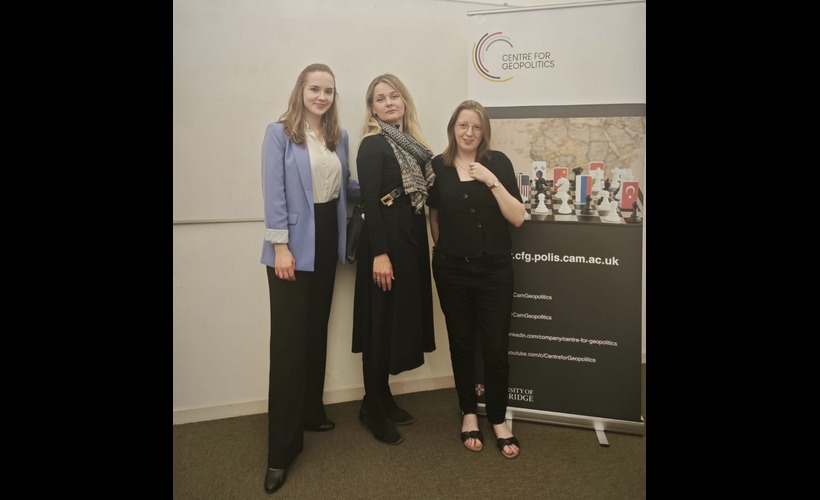In early October, the Centre sent delegations to two events in Poland to build new partnerships, network and advance understanding between our two regions.
Warsaw Security Forum, 5-6 October 2021
By Suzanne Raine

The Centre for Geopolitics organised a roundtable on “What does ‘Global Britain’ mean for the role of the UK and NATO in the Geopolitics of the Baltic Sea Region?” at the 2021 Warsaw Security Forum (https://warsawsecurityforum.org). This was chaired by Charles Clarke and the panel members were Tobias Ellwood MP, Chair of the UK’s Defence Select Committee, Małgorzata Bonikowska, President of the Centre for International Relations, Suzanne Raine from the Centre for Geopolitics and Shashank Joshi, Defence Editor of the Economist. The panel was notable for being the only UK panel at the Forum and attracted interest from attendees who wanted to understand how Britain viewed its role in the region after Brexit. At a time of increased tension in Eastern Europe, we stressed the importance of continued commitment to the region, and of deepening understanding. It was very useful for the Centre for Geopolitics delegation to hear first-hand how the actions of Russia and Belarus but also increasingly of China were impacting on the region, particularly through the use of hybrid or sub-threshold tactics.
International Conference ‘Gdańsk-Danzig-Gduńsk within the Baltic Borderlands’, 8 – 9 October 2021
By Donatas Kupciunas

The Conference was born out of successful cooperation between the Centre for Geopolitics and the University of Gdansk in the Baltic Geopolitics Network. Conference participants were greeted at the European Solidarity Centre (ECS), with a warm welcome by Basil Kerski, the Centre’s director, followed by a stimulating tour d’horizon of the Baltic region by the acclaimed historian Norman Davies. The highlight of the day was the meeting with the former Polish president Lech Wałęsa, who shared his insights on the challenges for the unity of Europe and hosted a Q and A session. Conference guests also had an opportunity to learn more about the revolutionary roots of Wałęsa’s Solidarność from a world-class ECS exhibit.
The Conference had four panels. The first, named ‘At the crossroads of international commerce in Baltic Sea region’, was moderated by Anna Mazurkiewicz (University of Gdansk) and traced the commercial development of the Baltic region from the late medieval period to 1930s. The panel contained papers by Hugo Bromley (Cambridge), Marta Grzechnik (Gdansk), Beata Możejko (Gdansk), Brendan Simms and Thomas Peak (Cambridge/Vilnius). The second panel, moderated by Alexander Drost of the University of Greifswald, concentrated on the Russian expansion in the Baltic sea region and had papers by Arkadiusz Janicki (Gdansk), Michalina Petelska (Gdansk) and Iwona Sakowicz (Gdansk). The third panel, chaired by Brendan Simms (Cambridge), moved the focus on the changing relationship between Great Britain, Poland and Gdansk in the 20th century, with papers by Miłosława Borzyszkowska-Szewczyk (Gdansk), Jacek Kołtan (ECS), Donatas Kupciunas (Cambridge) and Jacek Tebinka (Gdansk). The last panel, moderated by Marta Grzechnik (Gdansk), attempted to look at the history of the Baltic region through the perspective of art and architecture, with excellent submissions by Volha Barysenka (Gdansk), Rosalind Polly Blakesley (Cambridge), Małgorzata Omilanowska (Gdansk), Anna Sobecka (Gdansk) and Andrzej Woziński (Gdansk).
On the final day, conference participants were treated to a fascinating tour around the historical Gdansk, the Shakespeare Theatre, the Westerplatte peninsula, and the famous Museum of the Second World War in Gdansk. The Cambridge delegation also witnessed demonstrations in support of the European Union, which were replicated in other cities across the country. Conference materials will be published in a joint effort by the Centre for Geopolitics and the University of Gdansk.








